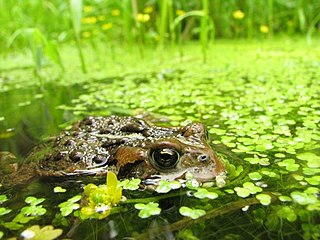
Ecology is the natural science of the relationships among living organisms, including humans, and their physical environment. Ecology considers organisms at the individual, population, community, ecosystem, and biosphere levels. Ecology overlaps with the closely related sciences of biogeography, evolutionary biology, genetics, ethology, and natural history.

An ecosystem is a system that environments and their organisms form through their interaction. The biotic and abiotic components are linked together through nutrient cycles and energy flows.
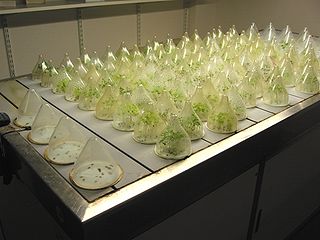
Plant physiology is a subdiscipline of botany concerned with the functioning, or physiology, of plants.
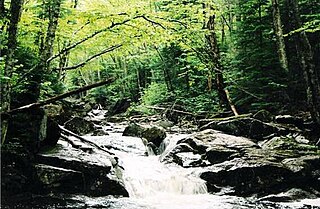
Ecosystem ecology is the integrated study of living (biotic) and non-living (abiotic) components of ecosystems and their interactions within an ecosystem framework. This science examines how ecosystems work and relates this to their components such as chemicals, bedrock, soil, plants, and animals.

Phenotypic plasticity refers to some of the changes in an organism's behavior, morphology and physiology in response to a unique environment. Fundamental to the way in which organisms cope with environmental variation, phenotypic plasticity encompasses all types of environmentally induced changes that may or may not be permanent throughout an individual's lifespan.
Ecophysiology, environmental physiology or physiological ecology is a biological discipline that studies the response of an organism's physiology to environmental conditions. It is closely related to comparative physiology and evolutionary physiology. Ernst Haeckel's coinage bionomy is sometimes employed as a synonym.
Howard Griffiths is a physiological ecologist. He is Professor of Plant Ecology in the Department of Plant Sciences at the University of Cambridge, and a Fellow of Clare College, Cambridge. He formerly worked for the University of Dundee in the Department of Biological Sciences. He applies molecular biology techniques and physiology to investigate the regulation of photosynthesis and plant water-use efficiency.
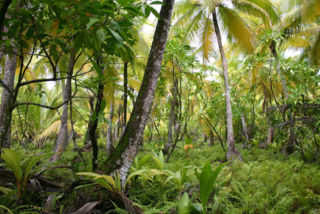
Plant ecology is a subdiscipline of ecology that studies the distribution and abundance of plants, the effects of environmental factors upon the abundance of plants, and the interactions among plants and between plants and other organisms. Examples of these are the distribution of temperate deciduous forests in North America, the effects of drought or flooding upon plant survival, and competition among desert plants for water, or effects of herds of grazing animals upon the composition of grasslands.

An autotroph is an organism that can convert abiotic sources of energy into energy stored in organic compounds, which can be used by other organisms. Autotrophs produce complex organic compounds using carbon from simple substances such as carbon dioxide, generally using energy from light or inorganic chemical reactions. Autotrophs do not need a living source of carbon or energy and are the producers in a food chain, such as plants on land or algae in water. Autotrophs can reduce carbon dioxide to make organic compounds for biosynthesis and as stored chemical fuel. Most autotrophs use water as the reducing agent, but some can use other hydrogen compounds such as hydrogen sulfide.
Daniel Israel Arnon was a Polish-born American plant physiologist and National Medal of Science recipient whose research led to greater insights into the operation of photosynthesis and nutrition in plants.

Science and technology in Venezuela includes research based on exploring Venezuela's diverse ecology and the lives of its indigenous peoples.
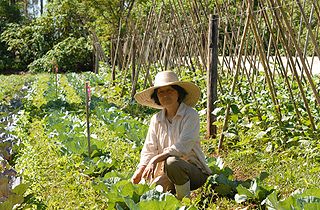
A nutrient cycle is the movement and exchange of inorganic and organic matter back into the production of matter. Energy flow is a unidirectional and noncyclic pathway, whereas the movement of mineral nutrients is cyclic. Mineral cycles include the carbon cycle, sulfur cycle, nitrogen cycle, water cycle, phosphorus cycle, oxygen cycle, among others that continually recycle along with other mineral nutrients into productive ecological nutrition.
Professor Fakhri Al-Bazzaz was an Iraqi-American plant ecologist specializing in the study of plant community ecological succession. A professor and prolific author, he was ranked amongst the top ten "Most Cited Scientists in Environment/Ecology, 1992–2002".
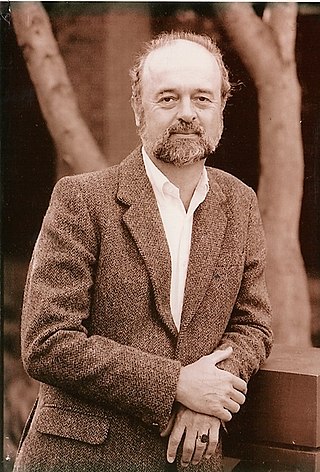
Carl F. Jordan is Professor Emeritus, Odum School of Ecology, University of Georgia.

Anthony William Derek Larkum is a British plant scientist and academic based in Sydney. He is professor emeritus of plant sciences at the University of Sydney and adjunct professor at the University of Technology Sydney (UTS).
Rodolfo Dirzo is a professor, conservationist, and tropical ecologist. He is a Bing Professor in environmental science at Stanford and a senior fellow at the Stanford Woods Institute for the Environment. His research interests mainly focus on plant-animal interactions, evolutionary ecology, and defaunation in the tropics of Latin America, Africa, and the Central Pacific. He was a member of the Committee on A Conceptual Framework for New K-12 Science Education Standards, co-authoring the framework in 2012, and continues to educate local communities and young people about science and environmental issues.
John Jeffrey Ewel is an emeritus professor and tropical succession researcher in the department of biology at the University of Florida. Most of his research was conducted through experimental trials to understand ecosystem processes in terrestrial and tropical environments. The results of the research provided the ability to further comprehend forest structure and management, as well as its nutrient dynamics. The primary research conducted dealt with the beginning stages of the regrowth and recovery following agriculture practices. Ewel also participated in studies regarding invasive species and restoration ecology.
Elvira Cuevas Viera is a Puerto Rican ecologist. She is a professor in the department of biology at University of Puerto Rico, Río Piedras Campus where she serves as director of the Center for Applied Tropical Ecology and Conservation.
Otto Ludwig Lange was a German botanist and lichenologist. The focus of his scientific work was on the ecophysiology of wild and cultivated plants as well as lichens. He investigated heat, frost and drought resistance of lichens, bryophytes and vascular plants growing under extreme environmental conditions.
Aimée Classen is an American ecologist who studies the impact of global changes on a diverse array of terrestrial ecosystems. Her work is notable for its span across ecological scales and concepts, and the diversity of terrestrial ecosystems that it encompasses, including forests, meadows, bogs, and tropics in temperate and boreal climates.










